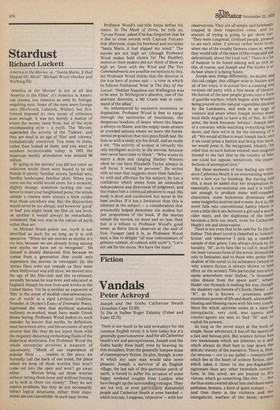Stardust
Richard Luckett
America in the Movies: or, "Santa Maria. It Had Slipped My Mind!" Michael Wood (Seeker and Warburg £5)
'America in the Movies' is not at all like 'America in the Films': it's America in American cinema, not Arnerica as seen by foreign, enquiring eyes. Some of the eyes were foreign once (Hitchcock, Lubitsch, Wilder), but Hollywood imposed its own terms of reference soon enough: it was not merely a matter of where the money came from, but of the style encompassing style a myth. The 'Movies' superseded the novelty of the 'Talkies', and they are dead in an age of 'film' and 'cinema' formalistically conceived. You went to them, rather than looked at them, and you went in numbers inconceivable today; in 1951 the American weekly attendance was around 90 million.
In 'going to the movies' you did not enter an unknown world; there were bound to be old friends in plenty: familiar actors, familiar sets, familiar landscapes, familiar plots. When you came out the world would seem, for a moment, slightly strange, somehow lacking the resilience to meet your heightened pulse; the winds outside a cinema were always a little colder than those anywhere else. But the disjunction would never be too abrupt, and however 'good' or 'bad' you might think the film on one level, on another it would always be remarkably consistent; this, too, was in the nature of myth rather than art.
As Michael Wood points out, myth is not identified as such for so long as it is still operative: "When we see movies as myths, it's too late, because we are already living among new myths we have yet to recognise". He himself is doubly distanced: first because he comes from a generation that could only experience the k movies in retrospect (in the 'sixties films were not remade as they were when Hollywood was still alive; we moved into the age of the film-club and the re-release); secondly because he was born and educated in England, though he now lives and works in the United States. Yet he is neither an exponent of 'film' in the sense of modish cine-sernanctiyse, nor of 'myth' in a rigid Levitical tradition. Meander, in Dryden's Essay of Dramatic Poesy, expressed the view that mythical material, endlessly re-worked, must have made Greek drama boring. Professor Wood makes no such mistake: he knows that myths, by definition, must have been alive, and his accounts of myth recover that life; they do not inject them with the elegantly distorting embalming fluids of the dialectical morticians. For Professor Wood the whole enterprise involves a measure of uncertainty. "Much of our experience of
popular films . . resides in the place we normally call the back of our mind, the place where we keep all those worries that won't come out into the open and won't go away either . . . Movies bring out those worries without letting them loose and without forcing us to look at them too closely". They do not resolve problems, but they do not necessarily infract logical structures, either; their statements are not convertiblein such easy terms.
Professor Wood's sub-title helps define his stance, In The Mask of Zorro, he tells us, Tyrone Power, asked if he has forgotten that he is due to cross swords with Captain Fulcano that afternoon, slaps his forehead and exclaims "Santa Maria, it had slipped my mind." The movies are not high art (though Professor Wood makes bold claims for The Hustler), moreover their makers did not think of them as high art. Gone with the Wind and The Ten Commandments are possible exceptions to this, but Professor Wood thinks that the director is the true hero of screen epic a view in which he follows Nathaneal West in The Day of the Locust: "Neither Napoleon nor Wellington was to be seen. In Wellington's absence, one of the assistant directors, a Mr Crane was in command of the allies".
So, unhampered by excessive reverence or dogmatism, Professor Wood is free to range through the territories of loneliness, the dangerous boudoirs of desire where the blame is always on Mame, and the empty main-streets or crowded saloons where we learn the fundamental proposition that nice guys finish last. He does so with a ready eye for detail, and as ready a wit: "The activity of women is virtually the only intelligent activity in the movies, because men never have time to think"; "Who wants to marry a drab and clinging Shelley Winters when he can have Elizabeth Taylor always in soft focus. It would be perverse". He writes with an ease that suggests more than familiarity with and affection for his subject; he has a confidence which stems from an unstudied independence and directness of judgment, and this makes him a continual pleasure to read. His study is short and condensed, but never in the least unclear. If it has a limitation then this is inherent in the subject a consideration that presumably helped determine the modest but just proportions of the book. If the movies remain the movies, no more and no less, then that is a tribute to Professor Wood's good sense: as Bette Davis observes at the end of Now Voyager (and it is, as Professor Wood says, a line to delight "all true connoisseurs of genuine rubbish, of rubbish with style"), "Let's not ask for the moon. We have the stars".
































 Previous page
Previous page